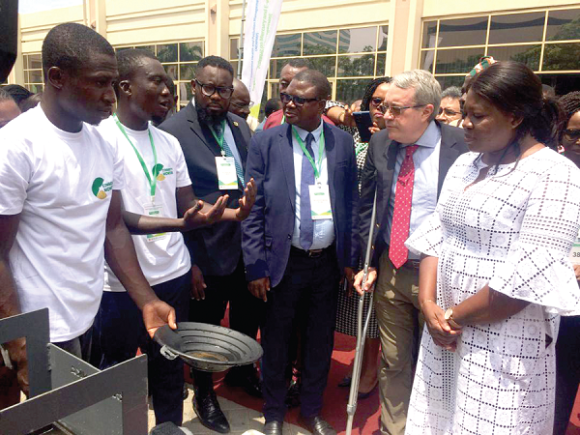
Govt to protect population from mercury, electronic waste pollution — EPA
The Environmental Protection Agency (EPA) has reiterated the government’s commitment towards mitigating the environmental and health risks associated with electronic waste and mercury use in artisanal small-scale gold mining (ASGM).
The Executive Director of the EPA, John Kingsley Krugu, said although the ASGM sub-sector offered many advantages and opportunities, its largely informal nature, resulted in unsustainable methods, which could lead to excess mercury use, posing significant environmental damage and health risks to humans.
He, therefore, said the agency had put in place several measures to tackle the problem, including the compilation of a National Mercury Inventory, Technology roadmap and access to finance and a health impact assessment of proposed ASGM pilot intervention sites.
“The EPA is implementing the Hazardous and Electronic Waste Control and Management Act and the corresponding Legal instrument L 2250 and technical guidelines to ensure efficient control and management of electronic waste by, among others, collecting the advanced recycling levy (eco-levy) on all electrical and electronic items imported into the country,” he added.
Event
Mr Krugu said this at the opening of a five-day regional conference on the management of mercury and e-waste implemented under the Africa Environmental Health and Pollution Management Program (AEHPMP).
The AEHPMP is a World Bank-funded initiative that aims at strengthening the institutional capacity to manage and regulate e-waste and the use of mercury in artisanal small-scale gold mining (ASGM) in Ghana, Tanzania, Kenya, Senegal and Zambia.
It also aimed at reducing exposure to mercury and unintentional Persistent Organic Pollutants (uPOPs) in the selected countries.
The event, hosted by the Environmental Protection Agency (EPA) under the auspices of the Ministry of Environment, Science, Technology and Innovation (MESTI), brought together policymakers, experts, academics, civil society organisations (CSOs) and industry players to discuss issues, challenges and opportunities related to the project.
It also provided a platform for the exhibition of technologies that help with the practical application of the solutions proffered by the AEHPMP.
Mandate
The EPA Executive Director stressed that the mandate of his outfit was to ensure that the actions of any individual or company were not negatively impacting the environment.
“That is the reason why before you do anything in the mining, manufacturing, building or oil and gas industries, among others, or anything that involves the use of chemicals, we will conduct an environmental impact assessment to see what the impact of whatever you are going to do will have and we will make sure that you put remediation measures before we give you the permit to operate,” he said.
Mr Krugu said the EPA had also raised awareness of the dangers of mercury to human health and the environment by cataloguing responsible methods of extracting gold without the use of mercury and making the information available to industry players.
He said the agency, in collaboration with private partners, had also identified various sites for the commencement of construction works for the collection and dismantling of e-waste centres across the country.
The Minister of MESTI, Ophelia Mensah Hayford, said the use of mercury in small-scale mining in the country was legal yet the improper handling, storage, use and disposal of mercury had resulted in some documented cases of mercury intoxication and poisoning among miners and non-miners in such communities.
She said the government was, therefore, committed to minimising the footprint of ASGM by promoting community mining and mercury-free gold mining extraction and processing techniques because available legislation alone could not do the job.
The World Bank Ghana Country Director, Robert R. Taliercio, expressed the worry that the exposure to mercury and other hazardous chemical pollutants had gone beyond a national issue to become a global concern.
“Pollution is a leading cause of death in other countries. An estimated 23 per cent of total deaths in the developing world are attributable to environmental factors, and pollution which is affecting the attainment of the SDGs,” he said.
